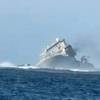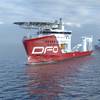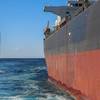IMO Environment Committee Issues Measures
The Marine Environment Protection Committee (MEPC) of the International Maritime Organization (IMO) agreed to circulate, via MEPC circulars, a package of interim and voluntary technical and operational measures to reduce greenhouse gases (GHGs) from international shipping and a work plan for its further consideration of market-based instruments to provide incentives for the shipping industry, when it met for its 59th session from 13 to 17 July 2009, at the IMO Headquarters in London.
These measures are intended to be used for trial purposes until the Committee's sixtieth session (MEPC 60) in March 2010, when they will be refined, as necessary, with a view to facilitating decisions on their scope of application and enactment. The measures include:
• interim guidelines on the method of calculation, and voluntary verification, of the Energy Efficiency Design Index for new ships, which is intended to stimulate innovation and technical development of all the elements influencing the energy efficiency of a ship from its design phase; and
• guidance on the development of a Ship Energy Efficiency Management Plan, for new and existing ships, which incorporates best practices for the fuel efficient operation of ships; as well as guidelines for voluntary use of the Ship Energy Efficiency Operational Indicator for new and existing ships, which enables operators to measure the fuel efficiency of a ship.
Market-based instruments:
The Committee held an in-depth discussion on market-based instruments and agreed a work plan for its further consideration of the topic, as of its next session (MEPC 60, March 2010), to build on discussions and submissions to date, taking into account also relevant outcomes of the climate change conference (COP 15) that the United Nations will convene in Copenhagen in December 2009. Such instruments would have two main purposes: to offset growing emissions in other sectors; and to serve as an incentive for the industry to invest in more fuel-efficient technologies.
Report to COP 15:
The outcome of the MEPC on GHG emissions from ships will be reported to COP 15, which will consider a successor instrument to the Kyoto Protocol to the UNFCCC.
Greenhouse gas study 2009:
The MEPC was assisted in its deliberations by the outcome of the Second IMO GHG Study on greenhouse gas emissions from ships, 2009, which is the most comprehensive and authoritative assessment of greenhouse gas emissions from ships engaged in international trade.
The Study estimated that ships engaged in international trade in 2007 contributed about 2.7 per cent of the world's anthropogenic CO2 emissions and also states that emission reductions are feasible through technical and operational measures as well as through the introduction of market-based reduction mechanisms.
In the absence of global policies to control greenhouse gas emissions from international shipping, the emissions may increase by between 150 and 250 percent by the year 2050 due to the expected continued growth in international seaborne trade.












